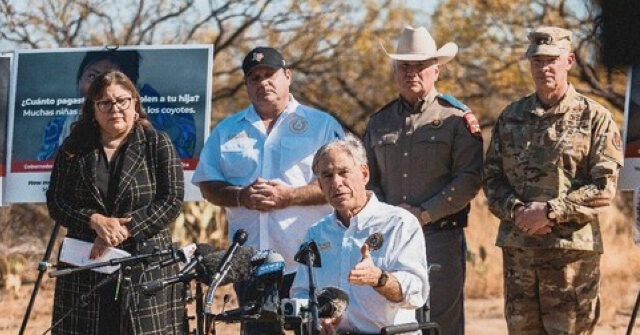Texas Governor Greg Abbott has initiated a controversial billboard campaign aimed at discouraging illegal immigration from Mexico and Central America. The billboards deliver stark messages to potential migrants, highlighting the dangers they may face on their journey and the severe consequences of crossing into Texas unlawfully. One particularly provocative billboard asks migrant parents, “How much did you pay to have your daughter raped?”—a statement intended to shock and provoke reflection. Abbott unveiled this campaign during a press conference in Eagle Pass, Texas, stating it is designed to provide a realistic picture of the risks involved for those considering illegal immigration.
During the announcement, Abbott was joined by various stakeholders, including ranchers, safety officials, and community leaders, who have expressed support for the campaign. Texas Association Against Sexual Assault CEO Rose Luna emphasized the need to address the significant issues of sexual assault that often accompany the migration experience, especially for women and children. She asserted the importance of acknowledging these harsh realities, framing it as a moral responsibility to raise awareness about the grave dangers that migrants may encounter.
The billboard initiative is expansive, with over 40 strategically placed signs targeting key areas in Mexico, Guatemala, El Salvador, and Honduras—regions often associated with high levels of migration. The messages on these billboards aim not only to warn potential migrants about the perils of their journey but also to inform them about the legal repercussions they might face upon entering Texas without authorization. The campaign reflects a broader strategy by the state to confront the immigration challenges at its southern border while raising awareness about the violence that can occur during the migration process.
Support for the billboard campaign has come from local ranchers like Kimberly Wall, who shared her personal experiences with the threats posed by human traffickers. Wall’s testimonies highlight the alarming incidents of violence, including sexual assaults, that have occurred in her proximity, contributing to a pervasive atmosphere of fear among residents. She described encounters with victims and the discovery of “rape trees,” which serve as grim symbols of the violence often suffered by women and girls in transit. Wall’s experiences underscore the urgent need for interventions aimed at protecting vulnerable populations who often risk their lives in search of a better future.
In addition to Spanish-language billboards, the campaign includes messages in other languages, such as Arabic, Chinese, and Russian, targeting specific populations within the broader border region. This approach signals an effort to address the diverse backgrounds of individuals who attempt to cross into the United States. Abbott’s administration is responding to a notable increase in apprehensions of Special-Interest Aliens, particularly in the Eagle Pass area, further fueling the state’s commitment to border security and migrant deterrence.
The billboard campaign has generated a range of reactions, from support among some community leaders who see it as a necessary measure to protect migrants from exploitation, to criticism from advocates who argue that it could further stigmatize vulnerable populations. Critics point to the potential ethical implications of equating migration with violence and suffering, arguing that the conversation around immigration needs to include discussions on safety, legal assistance, and the underlying reasons why individuals choose to leave their homes. The complexities of immigration remain contentious in the United States, making Abbott’s billboard campaign part of a broader and deeply polarized debate about how to handle the ongoing crisis at the southern border.

